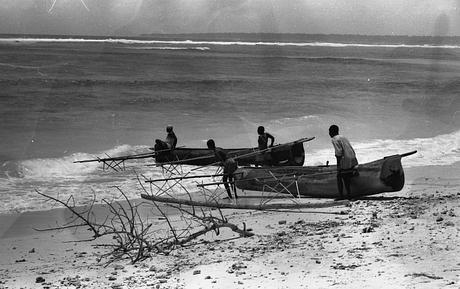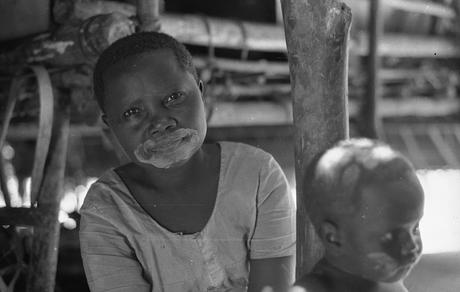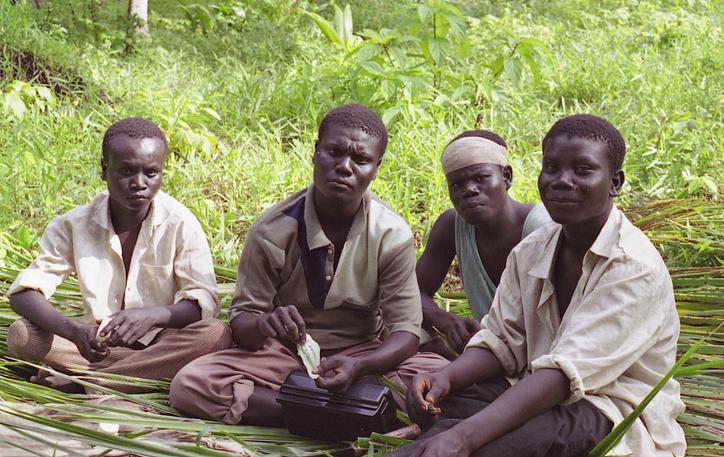The Onge are one of the peoples of India’s Andaman and Nicobar Islands. They were the sole permanent inhabitants of Goubalambabey (known to non-Onge as Little Andaman) until the 1940s when their island was occupied by settlers from India and Bangladesh.
A history of upheaval
The Onge call themselves En-iregale, which means ‘perfect person.’ They have long lived on Little Andaman Island, the most southerly island in the Andaman archipelago.
In the 19th century, the British colonial authorities forced contact upon the Onge. After several British sailors went missing on Little Andaman Island in 1867, the authorities blamed the Onge and sent a punitive expedition to attack them. The Onge were subjected to naval bombardment and it is estimated that between 60 and 80 Onge people were killed in this massacre. Meanwhile, five British soldiers were given the Victoria Cross, Britain’s highest military honour.
The Onge continued to experience attacks from British colonial forces and have also faced great hardships following Independence. Previously a nomadic people, in 1976 the Onge were forcibly settled by the Indian government in order to have ‘the basic facilities for hygienic living and protection against elements of nature’. Having previously had all 732 sq km of the island to themselves, they are now confined to a small area in Dugong Creek, where their overall health and wellbeing has declined.
 © Survival International 2008
© Survival International 2008
The Onge’s new settlements were completely destroyed by the Indian Ocean tsunami in 2004 but all the Onge survived. They knew that if the sea receded rapidly it would later rush back with a destructive power. When they felt the earthquake and saw the water level drop dramatically they gathered on the shore and hurled stones into the sea to trick the angry spirits (who they believed were shaking the pillar that holds up the sea) into believing that the Onge were in the water. They then quickly headed inland, safe from the waves that they knew would follow.
Much of Little Andaman Island has been deforested and the Onge must now compete with settlers for wild boar and fish. Although the Onge still spend much of their time hunting and collecting honey in what remains of their forest, they are largely dependent on the Andaman and Nicobar authorities for rations of rice, lentils and other commodities. Concerned by the dependency they had created, the Indian government attempted to force the Onge to work for their rations in a coconut plantation, a form of bonded labour, but these plans were later abandoned.
The Onge consider white teeth a sign of a dead body so they chew a bark to turn their teeth red. They decorate their bodies and their faces with white clay and ochre.
Despite government rations and medical care, their health has declined since they were settled and they suffer from high rates of malnutrition and perilously low population growth rate. Infant and child mortality rates doubled in the years after they were settled.
 © Survival
© Survival
The Onge’s population suffered a further devastating blow in 2008 when eight Onge men died after drinking an unknown poisonous liquid they had found on the shore. It is believed that the Onge thought the liquid was alcohol, which has been introduced to the Onge by settlers.
A new threat
Over many decades, Onge have suffered terrible losses and trauma following the effects of forced contact with outsiders, but a proposed Indian government mega-project has the potential to wipe them out entirely. In 2016, the Indian government proposed to transform Little Andaman Island into the “Singapore of India”, complete with an opera house, casinos and an underwater resort. Meanwhile, the Onge were set to be forcibly evicted and moved to another part of the island, upheaving a population who have already faced so many traumas in their recent history.
Thankfully, the project has been effectively stalled since 2021, however there have been periodic calls by some Indian officials for it to be restarted. Survival has written to the Indian government calling for no such development to take place on the Onge’s territory without their Free, Prior and Informed Consent.
Meanwhile, a parallel mega-project aimed at transforming Great Nicobar Island into the “Hong Kong of India” is set to devastate the neighbouring Shompen people. The Indian government is pressing ahead with this mega-project regardless of the overwhelming evidence that it will wipe out the Shompen people. Survival is campaigning against this highly destructive project so that the Shompen can live in peace on their island.
Join the mailing list
There are more than 476 million Indigenous people living in more than 90 countries around the world. To Indigenous peoples, land is life. Find out more about them and the struggles they’re facing: sign up to our mailing list for occasional updates.

